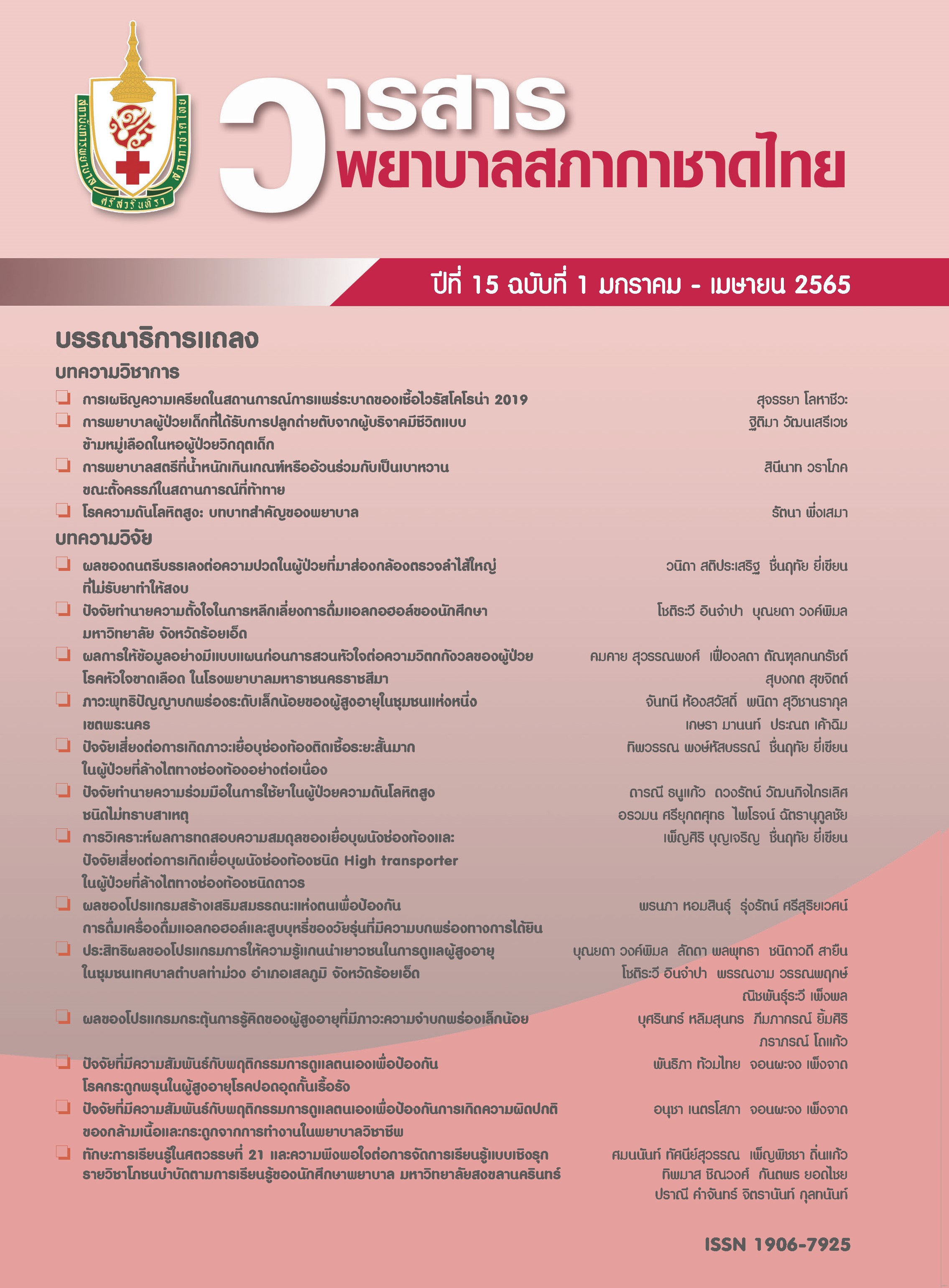Coping with Stress During The COVID-19 Outbreak
Keywords:
Coping with stress, Stress, COVID-19Abstract
The spread of the Coronavirus, which is a pandemic, has greatly affected world. The illnesses has impacted not only physical health but also caused stress and anxiety in the lives of all groups of people. Workers have adjusted their duties to maintain distance from society, thus creating a need for a new learning system. If stress accumulates at an excessive level, it will also affect physical health causing insomnia, loss of appetite, fatigue, headache, and stomachache, and mental health causing irritability, anger, boredom, anxiety, and sadness, and could lead to introverted behavior, thus causing quarrels. Conflict and stress, if not properly managed, can lead to depression and risk of suicide. There are ways to cope with stress throughout the whole body, including socially distanced exercises at home such as stretching muscles, mindfulness and meditation to help ensure enough sleep, and mental health focusing on mindfulness to deal with sudden problems. It may be done by breathing in and out and choosing to receive news from reliable sources, reducing environmental stimulation to oneself, and self-monitoring of stress.
References
Department of Disease Control. The situation of COVID-19 infection in the country [Internet]. 2021 [cited 2021 Aug 12]. Available
from: https://ddc.moph.go.th/viralpneumonia/. (in Thai)
Sangsirilak A, Sangsirilak S. Stress and depressed mood in healthcare workers during COVID-19 outbreak. J Psychiatr Assoc Thailand 2020;65(4):401-8. (in Thai)
Lazarus RS, Folkman S. Stress appraisal and coping. New York: Springer; 1984.
Wu T, Jia X, Shi H, Niu J, Yin X, Xie J, Wang X. Prevalence of mental health problem during the COVID-19 pandemic: a systematic review and meta-analysis. J Affect Disord 2021;281: 91-8. doi: 10.1016/j.jad.2020.11.117
Zhang J, Lu H, Zeng H, Zhang S, Du Q, Jiang T, et al. The differential psychological distress of populations affected by the COVID-19 pandemic. Brain Behav Immun 2020;87:49-50. doi: 10.1016/j.bbi.2020.04.031.
Gao J, Zheng P, Jia Y, Chen H, Mao Y, Chen S, et al. Mental health problems and social media exposure during COVID-19 outbreak. PLoS One 2020;15(4):e0231924. doi: 10.1371/journal.pone.0231924.
World Health Organization. WHO Director-General's statement on IHR Emergency Committee on Novel Coronavirus (2019-nCoV) [Internet]. 2020 [cited 2021 Aug 12]. Available from: https://www.who.int/director-general/speeches/detail/who-director-general-s-statement-on-ihr-emergency-committee-on-novel-coronavirus-(2019-ncov)
Liu N, Zhang F, Wei C, Jia Y, Shang Z, Sun L, et al. Prevalence and predictors of PTSS during COVID-19 outbreak in China hardest-hit areas: gender differences matter. Psychiatry Res 2020;287:112921. doi: 10.1016/j.psychres.2020.112921
Qiu J, Shen B, Zhao M, Wang Z, Xie B, Xu Y. A nationwide survey of psychological distress among Chinese people in the COVID-19 epidemic: implications and policy recommendations. Gen Psychiatr 2020;33(2):e100213. doi: 10.1136/gpsych-2020-100213.
Centers for Disease Control and Prevention. Coping with stress [Internet]. (n.d.). [cited 2021 Aug 12]. Available from: https://www.cdc.gov/coronavirus/2019-ncov/daily-life-coping/managing-stress-anxiety.html
Downloads
Published
Issue
Section
License
Copyright (c) 2022 Srisavarindhira Thai Red Cross Institute of Nursing

This work is licensed under a Creative Commons Attribution-NonCommercial-NoDerivatives 4.0 International License.
เนื้อหาบทความหรือข้อคิดเห็นต่างๆ ในวารสารพยาบาลสภากาชาดไทยนี้ เป็นความคิดเห็นของผู้เขียนบทความ ไม่ใช่ความเห็นของกองบรรณาธิการ หรือสถาบันการพยาบาลศรีสวรินทิรา สภากาชาดไทย






